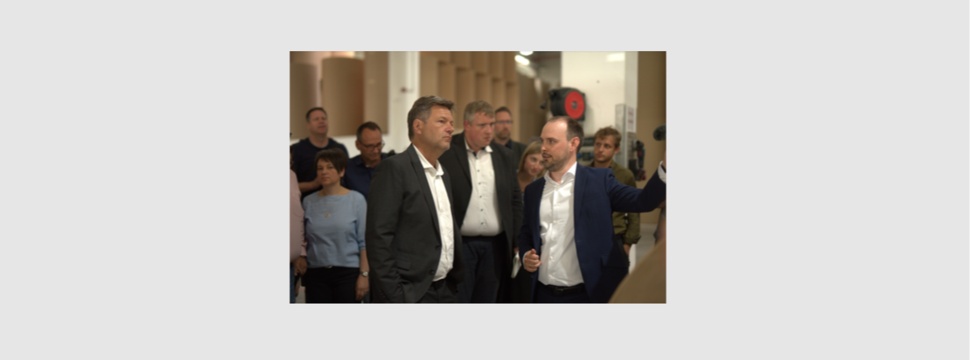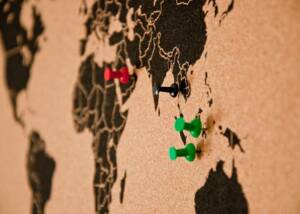Boost for the Upper Palatinate as a location for industry - Robert Habeck visits packaging park in Plößberg
News General news
The Federal Minister for Economic Affairs and Climate Action visited Progroup’s corrugated sheetfeeder plant PW09 and the associated packaging park partner, Liebensteiner Kartonagenwerk GmbH, in Plößberg. He took the opportunity to gain a personal impression of the packaging park's sustainable business model.

“The packaging industry is essential for any economy to work properly. Without paper there is no packaging, and without packaging goods would stop flowing. We thank Minister Habeck for taking the time to come and talk to us in person,” says Maximilian Heindl, deputy CEO of Progroup.
Successful packaging park model: Growing together in partnership
Progroup's whole business model is geared towards doing sustainable business. The company focuses on the long term in everything it does: In its investments, the lifespan of its facilities and in its relationships with its customers and suppliers. The packaging park which it shares with Liebensteiner Kartonagen GmbH is a shining example of this. It combines two production steps which follow one another directly: The manufacture of corrugated board sheets, and the production of cardboard packaging.
“Our packaging park is a complete success story. We provide 80 per cent of the work for Progroup's plant in Plößberg. We have grown together here as equal partners. Progroup caters for 99.9 per cent of our demand,” stresses Bernhard Schön.
High-tech production with a focus on sustainability
Liebensteiner Kartonagen GmbH has been Progroup’s customer from day one. The two family-run companies have been cooperating since 1992, and since 2015 this has been as part of the packaging park. With a working width of 2.5 metres, the corrugated sheetfeeder plant is able to manufacture over 100,000 tonnes of corrugated board per year. The Green Hightech strategy that Progroup consistently follows means less use of energy and raw materials as well as lower CO2 emissions coupled with enhanced performance. Integrated in PW09, for example, is a combined heat and power plant which supplies the plant with power, heat and cold.
The two production halls of Progroup and Liebensteiner are linked by a large doorway through which the stacks of corrugated board sheets are delivered from Progroup fully automatically via a conveyor belt to its neighbour. This means they do not require any means of transport or packaging. “The packaging park concept enables us to significantly reduce noise and CO2 emissions,” says Heindl.
Continuing to reduce the use of fossil fuels over the long term
As part of its corporate strategy, Progroup’s objective is to continue to reduce its dependence on fossil fuels. Thanks to the combined heat and power plant at its paper factory in Eisenhüttenstadt, the company's production is already not reliant on natural gas. At the paper factory in Sandersdorf-Brehna, Progroup’s circulating water treatment plant provides it with biogas which already covers 10% of the energy demand there. Right now it is becoming evident how important it is to have an energy supply that does not rely on fossil fuels. This is why the company is also planning a CHP plant at its site in Sandersdorf-Brehna. This is one example of how the paper industry can make a vital contribution to ensuring independence when it comes to energy policy.










